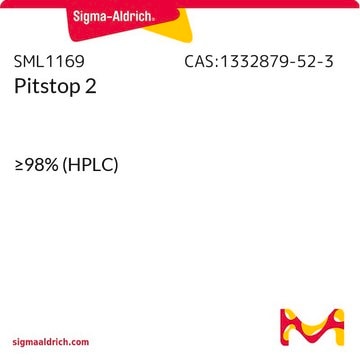SAE0088
Filipin complex ready made solution
from Streptomyces filipinensis, 5mg/ml in DMSO based solution
Synonym(s):
Filipin solution
Sign Into View Organizational & Contract Pricing
All Photos(1)
About This Item
UNSPSC Code:
12352200
NACRES:
NA.77
Recommended Products
Assay
≥90% (HPLC)
form
ready-to-use solution
storage condition
protect from light
shipped in
dry ice
storage temp.
−20°C
General description
Filipin Complex, the collective name given to family of isomeric polyene macrolides isolated from cultures of S. filipinensis, with Filipin III being the majority part of the complex.
Application
Filipin complex readymade solution has been used in the staining of HeLa cells for cytoskeletal imaging.
Filipin has been used in a double staining procedure as a probe for the detection of lipoproteins in polyacrylamide gel and immobilized on nitrocellulose membranes. It is also widely used to localize and quantitate unesterified cholesterol by virtue of a specific fluorescent complex.
Biochem/physiol Actions
Filipin is an antibiotic with antifungal functionality. Filipin complex has been found to alter cell membrane structure by interacting with the membrane sterols ergosterols and cholesterol. On binding to cholesterol, filipin shows fluorescence shift. As such, filipin complex has become a useful tool for diagnosis of Niemann-Pick type C disease, and for detection and quantification of cholesterol in cell membranes and lipid quantification in brain.
Other Notes
Filipin complex ready made solution is very sensitive to air and light. Upon receipt aliquot and store at -20°C. Avoid freeze thaw cycles.
Filipin complex is used in various concentrations depending on the specific protocol used. Dilute 5mg/ml stock solution with appropriate buffer according to the used protocol.
Filipin complex interaction with cholesterol alters the absorption and fluorescence spectra, for visualization with a fluorescence microscope use excitation at 340-380 nm and emission at 385-470 nm (Filipin fluorescent staining photo-bleaches very rapidly, thus the sample should be analyzed immediately).
Filipin complex is used in various concentrations depending on the specific protocol used. Dilute 5mg/ml stock solution with appropriate buffer according to the used protocol.
Filipin complex interaction with cholesterol alters the absorption and fluorescence spectra, for visualization with a fluorescence microscope use excitation at 340-380 nm and emission at 385-470 nm (Filipin fluorescent staining photo-bleaches very rapidly, thus the sample should be analyzed immediately).
Storage Class Code
10 - Combustible liquids
WGK
WGK 2
Flash Point(F)
188.6 °F - closed cup
Flash Point(C)
87 °C - closed cup
Certificates of Analysis (COA)
Search for Certificates of Analysis (COA) by entering the products Lot/Batch Number. Lot and Batch Numbers can be found on a product’s label following the words ‘Lot’ or ‘Batch’.
Already Own This Product?
Find documentation for the products that you have recently purchased in the Document Library.
Customers Also Viewed
Xi Zhao et al.
Redox biology, 62, 102678-102678 (2023-03-21)
Elevated lipid peroxidation (LPO), usually present in the tumour microenvironment (TME), is profoundly implicated in antitumour immunity and may be targeted for the development of new antitumour therapies. However, tumour cells may also rewire their metabolism to survive elevated LPO.
The pentaene macrolide antibiotic filipin prefers more rigid DPPC bilayers: a fluorescence pressure dependence study
Castanho MRB, et al.
Biochimica et Biophysica Acta - Biomembranes, 1419(1), 1-14 (1999)
Maximilian Jobst et al.
Archives of toxicology (2022-10-11)
Bladder cells are constantly exposed to multiple xenobiotics and bioactive metabolites. In addition to this challenging chemical environment, they are also exposed to shear stress originating from urine and interstitial fluids. Hence, physiological function of bladder cells relies on a
Liyang Li et al.
Clinical and translational medicine, 12(6), e902-e902 (2022-06-10)
Hypercholesterolemia is found in patients with chronic lung inflammation, during which airway epithelial cells play important roles in maintenance of inflammatory responses to pathogens. The present study aims at molecular mechanisms by which cholesterol changes airway epithelial sensitivity in response
Filipin recognizes both GM1 and cholesterol in GM1 gangliosidosis mouse brain
Arthur JR, et al.
Journal of Lipid Research, 52(7), 1345-1351 (2011)
Our team of scientists has experience in all areas of research including Life Science, Material Science, Chemical Synthesis, Chromatography, Analytical and many others.
Contact Technical Service














